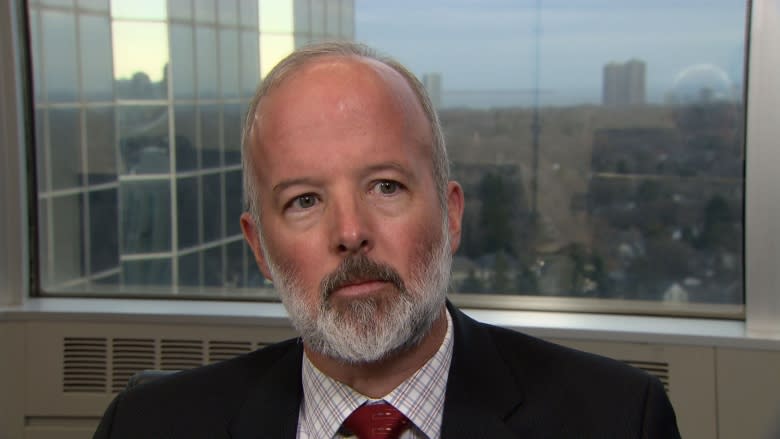Homelife Superstars realtor accused of duping homebuyer of $12K
Ajit Bains says he was tricked into signing a representation contract with a Homelife Superstars realtor — leaving him with a lien on his home and $12,280 in debt.
The 45-year-old Ontario man, who immigrated to Canada from India in 1990, predominantly speaks Punjabi and has limited English skills.
When he decided to buy a house for his family in 2011, he trusted word of mouth for a recommendation on a real estate agent.
That led him to Charandeep Singh Dhaliwal, who goes by the name D.P. Dhaliwal, an agent with Homelife Superstars Real Estate in Brampton, Ont.
With his 17-year-old son Dalraj helping to translate, Bains told Go Public that Dhaliwal showed him a few houses, and in April 2011, he put a written offer on two homes.
Bains said those offers fell through and soon after his relationship with the real estate agent changed. He says Dhaliwal became too busy to show him more houses when asked and eventually there was no contact at all.
In August 2011, Bains met Re/Max realtor Aamir Yaqoob, who showed Bains one house.
Bains bought it, the deal closed and Yaqoob and the seller's agent, Ravinder Toor, who coincidentally worked for Homelife Superstars Real Estate, collected $20,000 in commissions.
Bains said he was happy with the deal until he got a letter informing him he had signed a representation agreement with Dhaliwal and now owed him $12,280.
On mobile? Click here to see the representation agreement
Bains told Go Public he was confused. He hadn't spoken to Dhaliwal in months and had no recollection of signing a representation agreement. He only remembers signing the offers that fell through.
Bains says he pointed out that Dhaliwal had no role in the purchase of his new house and his business with him had ended months ago, but to no avail.
He asked Dhaliwal for the original contract, but Bains says he only provided a copy, which showed Bains's signature on a year-long buyer representation agreement.
The agreement also included a 90-day "holdover" period, which stated, even after the contract expired, Bains would still have to pay Homelife Superstars Real Estate a commission if he purchased a home with another agent during that period.
Bains says he was stunned.
Dalraj Bains told Go Public he and his father don't know for sure when the representation agreement was signed, but they suspect it may have been slipped in with the offer for the first house.
"The contract was signed on a certain date my Dad put the offer on the house, so we believe the papers were signed within the offer papers, without my dad knowing," he said.
The teen believes his father was taken advantage of, pointing to an English progress report from 2007 which put his father's comprehension and vocabulary skills at a Grade 3/4 level.
On mobile? Click here to see the English progress report
"His English and his reading skills aren't that good ... He also had trust in his new friend basically and he didn't think someone of the same religion would do something like that to him."
In broken English, Ajit Bains told Go Public he specifically asked Dhaliwal what he was signing and was told it was just the offer, nothing more.
"And he suggest just for this house. I asked again. I say, 'Is just for this house?' That's what he say."
Dhaliwal and Homelife awarded money
The issue went to small claims court in January 2013.
Court transcripts show Dhaliwal said he explained the agreement to Bains in English, not Punjabi, believing Bains understood.
Dhaliwal also told the court the two men were the only ones in the room when the papers were signed.
In the end, a judge awarded Dhaliwal and Homelife Superstars Real Estate the money they were seeking.
"I have no reason to believe that fraud was committed on Mr. Bains by Mr. Dhaliwal. Nor do I have reason to believe that he misrepresented anything. The document was there for him [Bains] to read and sign, " Judge Marvin Kurz wrote in his judgment.
The judge also wrote:
"Let me say as an aside and in some ways truly I suppose is obiter dictum [an observation by a judge on a point of law not directly at issue] in what makes this decision particularly difficult is I do not think this agreement is fair. I think it is very one sided … But there are many one-sided agreements the courts have to uphold."
Dhaliwal's lawyer then put a lien on Bains's new home until the debt was paid.
Dhaliwal asked Go Public to direct our questions to his lawyer, Balwinder Sran. Both men told Go Public the issue was settled in court and they have nothing more to say. Homelife Superstars Real Estate failed to answer any questions.
'That is seriously not right,' says analyst
Situations like Bains's have some calling for tougher rules when it comes to representation agreements.
Don Campbell, author and senior analyst at the Real Estate Investment Network, says representation agreements are designed to protect buyers, sellers and agents. But they can be prone to abuse.
"If these agreements are used unscrupulously ... it's like walking into a car lot and before they'll even show you a car, asking you to sign an agreement [saying] if you ever buy a car anywhere in this city we get paid. You see the ridiculousness in that," Campbell says.
For more than 20 years, the Real Estate Investment Network has been analyzing real estate markets across Canada and Campbell says something's got to give.
"Does it need to change? Yes. does it need to be more specific? Yes. From the real estate boards across the country they have to find a way to make it more fair for the consumer.
"If the realtor on the other side, all they did was get that document signed, they are going to get paid whether you buy a house tomorrow or 15 months from now. That is seriously not right."
Campbell says the contracts are often included in the early paperwork. He suggests anyone buying or selling real estate refuse to sign a representation agreement that early in the client-realtor relationship.
"If you are forced to sign a buyer's representative agreement before you've done any work with them, I would put the brakes on."
When clients do sign, Campbell says they need to know any part of the agreement can be changed.
Realtors not expected to assess competence
When all other avenues failed for Bains, he and his son turned to the Real Estate Council of Ontario, filing a complaint against Dhaliwal with RECO in early 2014.
That too was unsuccessful.
Bruce Matthews, deputy registrar, regulatory compliance with RECO, told Go Public he can't speak about specific cases, but says the onus is solely on buyers when it comes to real estate deals.
"Generally speaking if you are able to … write your signature, we don't expect our real estate professionals to be assessing competence," he says.
Individual provinces are responsible for regulating how real estate is bought and sold. But none impose limits on the length of time an agent can lock a client into a contract.
There also seem to be no databases in Canada where agents are obligated to check on existing agreements before signing a new client.
"The best protection consumers can have is information. The more educated they become about the process, the more educated they become about the sorts of things they will be signing in the course of the real estate transaction, the better protected they are going to be," Matthews says.
Debt will take more than 3 years to pay off
Bains is now paying Dhaliwal, through his lawyer, $300 a month until the debt is paid off. Bains says that's all he can afford.
His son says the family has asked the lawyer for a terms of agreement, but Sran has yet to provide one.
"What the lawyer said was, 'You have my trust – just keep on paying the $300 money and really after that I'll take off the lien on the house that was placed. You don't need to worry about anything else.'"
At $300 a month, the debt will take 3½ years to pay off and Bains says his family is worried, because they are saddled with a debt they can't afford and another agreement that they worry could lead to more trouble.
Unconscionable advantage?
Go Public asked University of Calgary associate law professor Evaristus Oshionebo under what circumstances a contract could be thrown out in court. He points to two possibilities:
- The consumer has to prove not only that the misrepresentation was made to him, he also has to prove that the misrepresentation induced him to sign the contract.
- Then there's the issue of what's called unconscionable advantage. In legal terms, it refers to a contract where there is an unfair balance of power – and one party has taken advantage of another.
Bains's lawyer failed to raise unconscionable advantage as a possible defence in court.
Submit your story ideas:
Go Public is an investigative news segment on CBC-TV, radio and the web.
We tell your stories and hold the powers that be accountable.
We want to hear from people across the country with stories they want to make public.
Submit your story ideas to Kathy Tomlinson at Go Public.
Follow @CBCGoPublic on Twitter.





